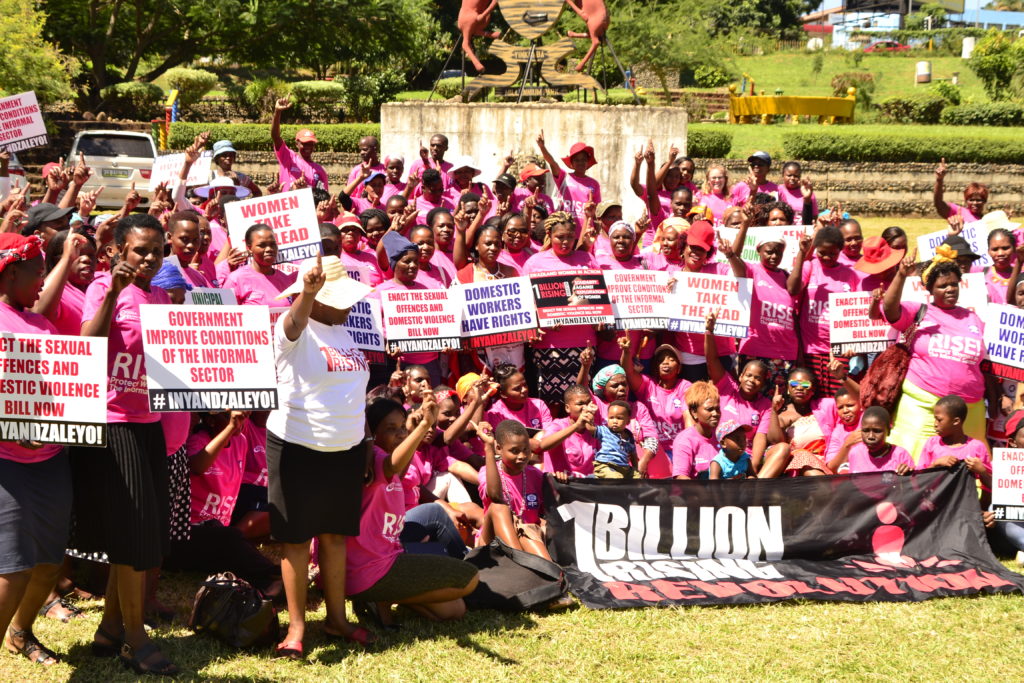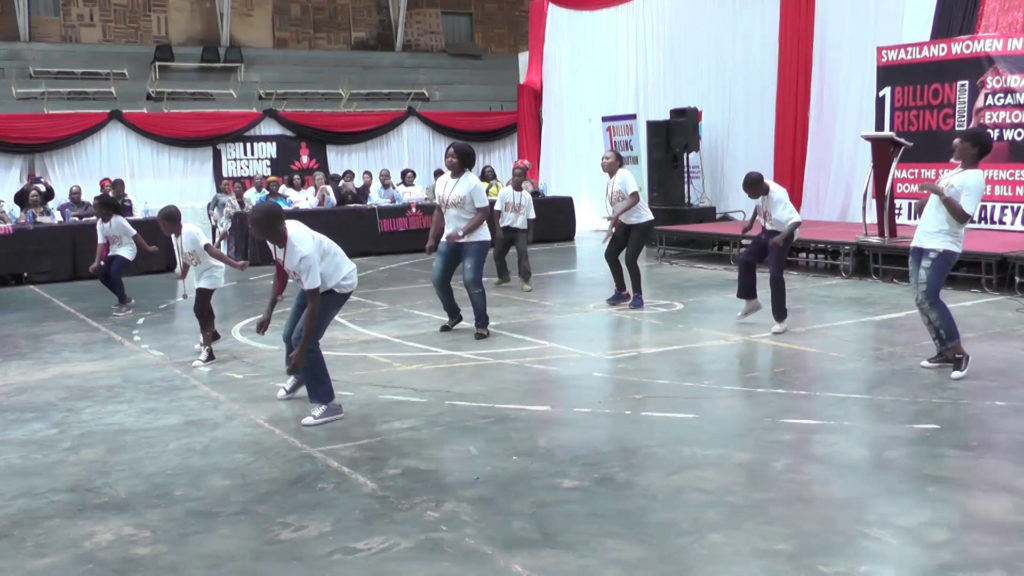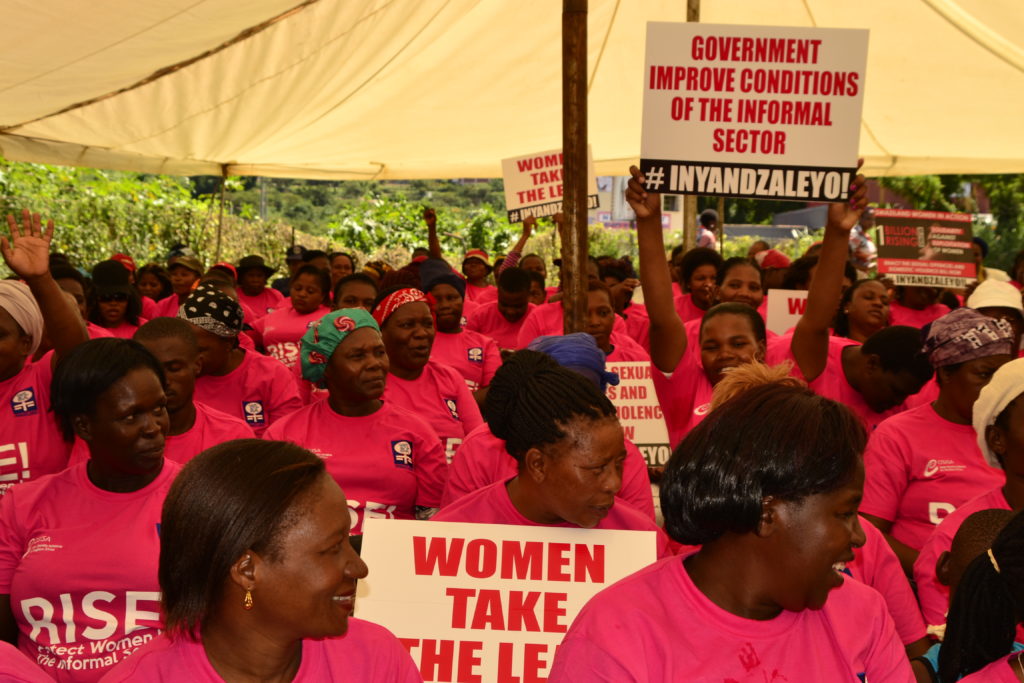
Women in the informal sector during the commemoration of women’s day.
This years theme was “Solidarity against the Exploitation of women and girls”. This theme was chosen because nationally women and girls comprise the majority of the population yet enjoy the least protection. Women and girls are vulnerable to abuse from all areas – economically, socially, politically – where they have few or no options for survival. These sectors are all interlinked and cannot be addressed through fragmentation but holistically. The deeply entrenched Swazi custom is an authority above the Constitution within the landscape of the country. It is a culture that enforces the submission and subjugation of women and girls creating an environment of oppression. Only through a united voice from the vulnerable population can true change be achieved. VAW issues highlighted were gender-based violence, exploitation of women in the informal sector and access to justice for women, as well as pushing for the enactment of the Sexual Offenses and Domestic Violence Bill.
The impact of the campaign was numerous.The campaign was highly successful at influencing people from all levels. It successfully brought together civil society, community members, members of parliament, development partners etc under one roof in order to highlight issues pertinent towards the advancement and protection of women and girls in Swaziland. All media outlets were supportive of the campaign with both print media companies having made many copies of their paper available to be dispensed amongst the crowd. Both available television stations in the country were also present to report on and support the campaign. The campaign presented a rare opportunity for community members through which they could air their grievances directly to the relevant stakeholders and the result was a call by a significant portion of the female audience calling for improved participation and representation of women in positions of leadership and governance. It is also worth mentioning that the Rising was also attended by other OBR Coordinators ( Zimbabwe and South Africa) in Africa as a way of showing solidarity on the issues that we are rallying with in Swaziland. Other organizations (including the International Women Peace group) from South Africa also joined in solidarity with women and girls of Swaziland. This was another strategy of putting pressure on the government.
The rising was not without challenges. One of the obstacles faced was providing transport for some of the community members scheduled to attend as they had to travel from distant places through rough terrain, which public transport operators refused to attempt for fear of damage to their vehicles. Also the threats of storm were a challenge. People were scared to leave their homes. But we engaged the services of local transport services with a noted familiarity of the rough terrain they would be traversing. Despite the threats of storm around 3000 people attended the rising.

OBR Swaziland song performance by the youth
To outreach the campaign we put in place several strategies to help engage and mobilize sectors. One of the strategies implemented was the invitation of women working in the informal sector as their voices had previously gone unheard. This would allow them an opportunity to directly engage with government officials on their rights and demands. Dance and music was used as a way to teach solidarity for women and children. The song and choreography was uniquely designed for the initiative. Another strategy was the invitation of both sexes in order to magnify the movements objective of complete unity not just unity of one sex. Influencers were engaged in order to create awareness and build support for the campaign, as well as the use of already existing paralegals in communities throughout the four regions. Social and print media were also useful tools in disseminating information about the campaign. A street march was organized comprising of community members singing cultural songs of empowerment to the people. The use of placards clearly outlining the people’s demands were utilized to reinforce the message to the general public and government. Finally an original song was composed by the youth as part of the campaign and further performed for all the people in attendance as well as through radio media.
This year’s OBR saw all sectors represented. The majority were coming from grassroots, since about 70 percent of Swaziland is rural. It is also worth mentioning that the social environment for the LGBTQ community in Swaziland is highly restrictive, stigmatized and discriminated against. We have to be sensitive when engaging with community members regarding LGBTQ rights. But the international treaties signed and ratified by Swaziland have been identified and we are strategically taking advantage of this and using it as an entry point.
There has been so much feedback for OBR in the country. The people have been very supportive and have provided positive feedback on the impact of the risings. The participants have expressed their enthusiasm towards supporting more of such campaigns. The participants view the risings as an opportunity for women to have their voices heard as well as to bring together people of various backgrounds under one roof, thereby creating a level of unity which had previously been unknown. The people believe that the disruption caused by public campaigns like OBR forces the government to heed their demands and address them as they are televised, allowing for a larger platform and more pressure applied to the relevant authorities.
There has been huge development in all the years we have been doing OBR. From the first time the OBR campaign took place in Swaziland there has been significant growth and support from various areas. The campaign has grown in strength and visibility, enjoying support not just from CSOs but community members from all four regions, government officials and the private sector. It has shifted from being an organization driven initiative but a movement that is recognized countrywide at all levels. The campaign itself now belongs to the people. It is influenced, driven and owned by community members. The OBR campaign has evolved in the country over the years, creating momentum and building voice amongst women who previously had no such platform through which they could air out their grievances.
We continue to Rise in Swaziland because we face so many issues affecting our women and girls. The biggest issues faced by women and girls in Swaziland is gender based violence ( as a country we do not have legislation that is aimed at addressing gender based violence); as well as access to justice. The unfortunate reality is that Swazi custom still has more sway on the daily lives of women leaving them with few opportunities for advancement. Even when they are empowered with knowledge on their rights they still face challenges in accessing legal protection due to exorbitant fees, dependence on male relatives or even the utilization of fear tactics by authority figures. The many issues are interlinked with this one major issue to women, which is access to justice in order to hold perpetrators accountable for their crimes and prevent future transgressions, as well as to protect the victim. Since Swaziland will be having elections in 2018, as OBR Swaziland our main agenda will be to push for more women to go to parliament. We will be pushing for women to position themselves to take part in the upcoming election and that men too should vote for women as a gender balanced society benefits both genders in a society. In the past four years, during the risings, through OBR we have been organizing women and communities by empowering them on their rights and building assertiveness within women.

![pic 3[1]](https://www.onebillionrising.org/wp-content/uploads/2017/04/pic-31-1024x683.jpg)
And the constituencies were in full support for the “Solidarity” theme. They stated their belief that only through solidarity and women rising up for their own rights could any true change be achieved in the country. The communities have expressed an eagerness to continue with the OBR campaign stating the diverse backgrounds, opinions and knowledge they gain from such campaigns. They also stated the excitement and hope for the future that they receive from OBR, as being with all the different types of people made them feel as though they were part of something important.
For this coming year we have a lot of new creative and artistic ideas. The use of theatre as an advocacy tool has been proven highly successful towards changing mind sets and conveying messages. Playback theatre in particular allows for active involvement from the audience and this engagement makes the message more personal. Engaging community members in the creation of placards and personal messages for the campaign as well as identifying which pressing issues to address would ensure that the campaign addresses urgent and prevalent issues for the women and girls of Swaziland. The use of symbolism (such as a color armband) in order to create sustainability would help keep the campaign and its objectives in the people’s minds even beyond one day. It would create unity amongst those already in support of women’s rights as well as initiate a conversation with skeptics.
For continuity, as in previous years OBR advocated for the advancement of women’s access to justice and has now called for solidarity. It is now time to actively call for immediate and tangible results. A call for immediate change in particular relating to women in leadership. The 2017 OBR campaign called for solidarity and the 2018 OBR campaign can call for proof of this solidarity by having women voted in positions of leadership and authority, not just by women but by men too.
The use of one global theme is highly successful in creating a movement with one voice. Focusing on one issue still relevant to the theme yet unique to each country, as OBR does, gives the people more ownership of the campaign and its outcome.